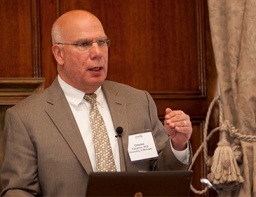Remember when Watson, the IBM supercomputer, competed against champions on the trivia game show Jeopardy! and won? The same technology could be interlaced into the practice of tomorrow’s physicians, necessitating a change in today’s medical education curriculum.
The era of ubiquitous information is upon us, and medical education will need to prepare future physicians to competently navigate this information. Charles Friedman, PhD, director of the health informatics program in the Schools of Information and Public Health at the University of Michigan (pictured left), gave attendees at the recent AMA Accelerating Change in Medical Education consortium meeting a glimpse at the informational future of med ed.
By 2020, the use of electronic health records will be pervasive, and “computable data will be increasingly woven into a learning health system so we can study ourselves and improve,” Friedman said. Physicians of the future likely will begin using a “knowledge cloud,” a system like Watson that will be able to answer questions in plain language.
Care decisions will be embedded into this knowledge cloud and make best practices readily available. The cloud will operate in push and pull modes—medical professionals will be able to pull from it by asking a question, and the cloud in turn will push itself into care processes when necessary. “It will require no arcane skills other than knowing how to ask a good question,” Friedman said.
For that reason, medical students will need to be attuned to their own knowledge, with the ability to evaluate what they do know—and what they don’t.
“Competent clinicians will be calibrated; they will know when to ask questions,” Friedman said. “In order to benefit from the cloud, they will be able to phrase a good question in order to get a good answer …. And competent clinicians will be able to make decisions using a cloud that will often give probabilistic and qualified answers.”
To prepare for this technology, Friedman said, med ed curriculum should incorporate competence assessment into the learning process, and should teach students to evaluate how they learn. This way, students can assess the best way to uncover what they don’t know.
“The emphasis moves from the facts to the scaffolding that organizes those facts,” Friedman said.
By 2020, medical students could be taking “open-cloud” exams, being tested on how well they can achieve the information they need based on the way questions are posed. Curriculum could include theory and practice of decision analysis, evidence-based decision-making in uncertain situations and data mining.
Friedman also emphasized a crucial component: “The cloud will not make decisions; people will,” he said. “The cloud will give advice, not orders. The cloud will explain reasoning, but the decision will involve patients, families and other clinicians. People remain in charge.”




